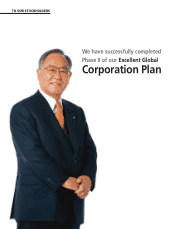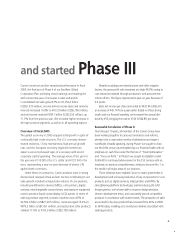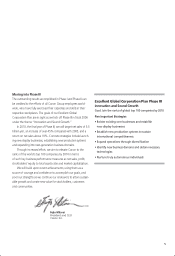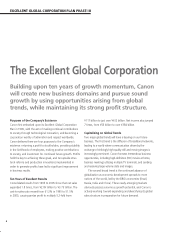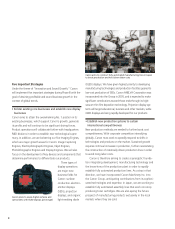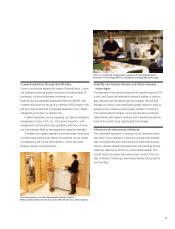Canon 2005 Annual Report Download - page 14
Download and view the complete annual report
Please find page 14 of the 2005 Canon annual report below. You can navigate through the pages in the report by either clicking on the pages listed below, or by using the keyword search tool below to find specific information within the annual report.
12
Disclosure
Disclosing accurate, fair and timely infor-
mation on management, business strategy
and financial results to capital markets is a
priority at Canon. In February 2005, the
Disclosure Committee was established,
with the president appointed as chairman,
to ensure that Canon is not only in compli-
ance with applicable laws, rules and
regulations, but also that information
disclosed to shareholders and capital
markets is both correct and comprehen-
sive. The President and CEO gives an
annual briefing on management policies,
while the CFO regularly gives briefings to
securities analysts and institutional
investors on quarterly financial results.
Corporate information on our Website is
made available in English, including audio
and video information, to respond quickly
to the needs of investors. The objective of
these IR activities is to gain the trust of
capital markets and to shape an appropri-
ate assessment of Canon’s stock price. We
carefully observe the rules relating to
information disclosure to capital markets in
Canon’s Disclosure Guidelines, strictly
controlling undisclosed information and
preventing the possibility of insider trading.
Significant Differences in
Corporate Governance Practices
between Canon and U.S.
Companies Listed on the NYSE
Section 303A of the New York Stock
Exchange (the “NYSE”) Listed Company
Manual (the “Manual”) provides that
companies listed on the NYSE must
comply with certain corporate gover-
nance standards. However, foreign
private issuers whose shares have been
listed on the NYSE, such as Canon Inc.
(the ”Company”), are permitted, with
certain exceptions, to follow the laws
and practice of their home country in
place of the corporate governance
practices stipulated under the Manual. In
such circumstances, the foreign private
issuer is required to disclose the signifi-
cant differences between the corporate
governance practices under Section
303A of the Manual and those required
in Japan. A summary of these differ-
ences as they apply to the Company is
provided below.
1. Directors
Currently, the Company’s Board of
Directors does not have any director who
could be regarded as an “independent
director” under the NYSE Corporate
Governance Rules for U.S. listed compa-
nies. Unlike the NYSE Corporate
Governance Rules, the Commercial Code
of Japan (the ”Code”) and the Law for
Special Exceptions to the Commercial
Code concerning Audit, etc. of Joint-
Stock Corporations (the ”Special
Exception Law”) do not require Japanese
companies with a board of corporate
auditors such as the Company to appoint
independent directors as members of the
board of directors.
The NYSE Corporate Governance
Rules require non-management directors
of U.S. listed companies to meet at
regularly scheduled executive sessions
without the presence of management.
Unlike the NYSE Corporate Governance
Rules, however, the Code and the
Special Exception Law do not require
companies to implement an internal
corporate organ or committee com-
prised solely of independent directors.
Thus, the Company’s Board of Directors
currently does not include any non-
management directors.
2. Committees
Under the Code and the Special
Exception Law, the Company may
choose to:
(i) establish an audit committee, nomina-
tion committee and compensation
committee and abolish the post of
corporate auditors; or
(ii) continue to retain a board of
corporate auditors.
The Company has elected to retain
its Board of Corporate Auditors, whose
duties include monitoring and reviewing
the management and reporting the
results of these activities to the share-
holders or Board of Directors of the
Company. While the NYSE Corporate
Governance Rules provide that U.S.
listed companies must have an audit
committee, nominating committee and
compensation committee, each com-


